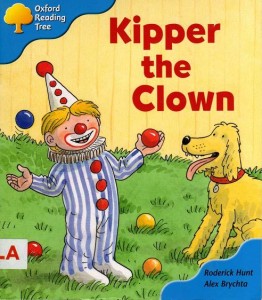curriculum EFL expectations extensive reading language courses Language learning readers Reading self-study teaching theory university
by sendaiben
5 comments
Extensive Reading, Goals, and Benevolent Tyranny
I received an email from Tom Robb this morning, creator of the Moodle Reader (a fantastic free resource to track and verify student reading within an ER program), very kindly answering some questions I asked him.
Among them he mentioned that I seem to be setting quite ambitious goals for my students in terms of the amount of reading I expect them to do. This isn’t the first time I’ve heard that comment, so I thought this would be a good chance to expand on the topic, as well as discuss a couple of peripheral issues that are pertinent to it.
First of all, in my extensive reading classes at Tohoku University, I require students to read at least 100,000 words in one semester. That is the amount of reading they have to do to pass the course and receive a credit. Beyond that, if they want to get an A or AA grade (the top grade), they have to read much more. Generally to have a chance of getting an AA, students would have to read around half a million words.
Talking to other teachers, I seem to have set the bar rather high.
The thing is, extensive reading (and language learning in general) is a numbers game. It’s not so much about what you do (although doing things that work for you does speed the process up) as it is about how much you do. How much reading do you do. How many words, books, hours? The more you do, the easier it becomes and the more you learn. There is a critical mass involved, too. According to Nishizawa et al. the turning point for their students came after they had read 300,000 words: after that, they found it much easier to read in English.
The flipside of this is that if you don’t read enough, you probably won’t reach this breakthrough moment.
I push my students hard. They are academically gifted, often motivated, and understand the reasons why they have to work so hard. The most committed report spending more than ten hours a week reading for my class.
None of my students failed to reach the 100,000 word level, and most of them did much better. I’m very proud of them.
There are several reasons I push them so hard. One is that they have a lot of catching up to do: very few of them have done much in the way of extensive reading or listening in their English learning so far. They have a great deal of knowledge about English (in the form of grammar patterns and knowing a Japanese translation for a lot of English words), but not as much familiarity with it (reading or listening fluency, knowledge of collocations, sense of register). They need a lot of input to catch up to their peers in other countries.
I’m also hoping to get them started on a habit of English. Creating a habit is often just a matter of gradually integrating it into your daily routine, so that it becomes ingrained, like brushing your teeth or reading a newspaper in the morning. If my students are going to have a shot at becoming proficient English users, they are going to have to make it a part of their lives. A semester is not a very long time, but I hope that at least some of my students will catch the reading bug and continue reading in English for an hour or two each week after the course is over.
Finally, I set ambitious goals for my students because they are very bright and very busy.
Busy people naturally try to optimise their time, spending it on more urgent or important things, while sometimes neglecting the less urgent but more important goals (getting mired in quadrant three from the Seven Habits of Highly Effective People) . I am the same -I know that I should be spending an hour or so a day learning Thai, but instead find myself catching up on grading because it is due tomorrow morning. By having high expectations of my students and setting them concrete goals I hope to push them a little closer towards the goal of English proficiency.
Not all of them will continue reading, of course. But some will. And even the ones that don’t will find themselves reading a little bit more quickly and easily.
Do you agree with setting ambitious targets? Can it sometimes be harmful? I’d love to hear from you in the comments below.
business curriculum EFL eikaiwa ES expectations presentations school management teaching technology testing theory
by sendaiben
4 comments
Another view of the future of education?
The latter half of this video may be of interest to teachers (the first half is just generally interesting, particularly if you are a closet entrepreneur wannabe). Similar to Ken Robinson’s famous talks on the same subject.
conference curriculum EFL eikaiwa expectations kids Language learning Oxford Reading Tree presentations readers Reading teaching theory Uncategorized
by sendaiben
2 comments
Oxford Teaching Workshop in Niigata (March 12th)
I’ll be presenting again as part of the Oxford Teaching Workshop 2011. It’ll be taking place in Niigata, at the Coop City Hanazono, on Saturday March 12th.
The lineup is as follows:
| Saturday, March 12, 2011 | |
| 10:00-10:30 | Registration |
| 10:30-11:20 | Reading in Class: Opening the Door to an English World Ben Shearon |
| 11:40-12:30 | Teaching Ideas to Add Variety and Spice to your Lessons Ritsuko Nakata |
| 12:30-13:30 | Lunch |
| 13:30-14:20 | What you need to know for Shogakko Eigo Katsudo! Setsuko Toyama |
| 15:00 | Doors Close |
I’ll be talking mainly about using the Oxford Reading Tree and other story books in class. Hope to see some of you there!
conference curriculum EFL expectations JALT language courses Language learning presentations readers Reading teaching theory university
by sendaiben
leave a comment
Extensive Reading Seminar 2011
I just got back from the 2011 ER Seminar, held in Okayama this year.
Had a good time, attended some useful presentations, and saw a bunch of great people. The best conference I have been to in a long time. Especially enjoyed the plenaries and Nakano sensei’s presentation. Got some actionable ideas to adopt(steal) for my classes.
Okayama also seemed like a nice place during the very limited time I was there 🙂
Miles Grogan was kind enough to shoot my presentation for me with my iPhone, so I have finally managed to upload one of my presentations to Youtube:
The quality is not great, but you get the idea. Here are the slides:
expectations life in Japan presentations teaching theory university writing
by sendaiben
leave a comment
Focus
My life is pretty busy, and to make it worse I tend to get interested in new things and lose interest in things pretty frequently. Focus, or lack of focus, is a big problem for me.
As I mentioned in my report card post I got a lot done last year. While I am pretty happy about that, I also get the feeling a lot of it was quite shallow. Some of it was okay, but not exactly legacy work.
This year will be different. I am going to consciously do less work, but make it count for more. To do more meaningful work, and to say no to more things. I am going to focus.
Wish me luck!


